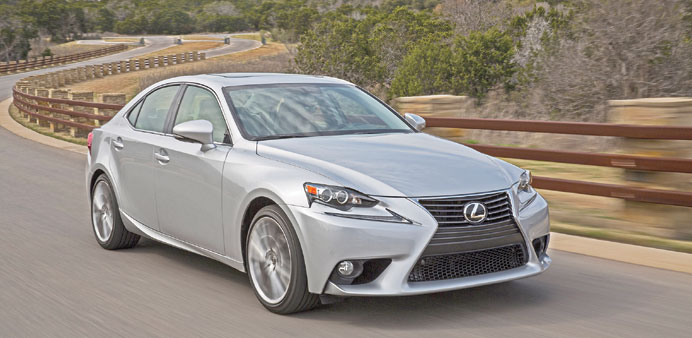The 2014 Lexus IS 250 plays up the athleticism of the brand’s smallest four-door sport sedan by growing its overall length 3 inches and widening its stance slightly.
By Susan Carpenter
For Lexus, the competition for entry-level luxury buyers is a race that isn’t won with flat-out speed. It’s an exercise in sophisticated sportiness, as exemplified by its newly updated IS 250.
Available this summer as a 2014 model, the $35,950-plus (price in the US) IS 250 plays up the athleticism of its smallest four-door sport sedan by growing its overall length 3 inches and widening its stance ever so slightly for a profile that makes it more aggressive without going overboard. Its front grille now mirrors that of Lexus’ larger GS and LS models, with a two-tone interpretation of its so-called spindle grille and new LED running lights that recall the famed Nike swoosh.
But the real sport story isn’t in its style. It’s more substantive. Powered with a spry, direct-injected 2.5-litre V-6 that is paired with a 6-speed automatic transmission and can be operated in manual mode, with paddle shifters that are now standard, the IS 250 also employs a new tri-mode drive system.
With the twist of a knob at the driver’s right elbow, the driving can be done in eco, normal or sport modes, each of which is apparent by the responsiveness of the accelerator. For those who are numb to the difference, though, there are visual cues. In eco mode, a portion of the dashboard is a calming blue; in sport, it’s adrenalised red.
The car can be even sportier with an F Sport package that grows the wheels to 18 inches, upgrades the suspension and even comes with its own soundtrack. The F Sport-enabled IS can be upgraded with an intake sound generator that amplifies the first phase of internal combustion to remind drivers that, yes, this is something of sports car.
Though a far cry from Lexus’ now-defunct $375,000-plus, 552-hp LFA supercar, the IS 250 still imports the driver-centric spirit of the LFA cockpit and some of its instrumentation into the dash, with low-slung bucket seats and a similar thin film transistor liquid crystal display that features a moving centre ring for the tachometer on the F Sport version.
The centre console is unusual and uniquely Lexus. The touch screen is recessed deep within the dash, and can be operated with a controller that works similarly to a computer mouse. An analog clock is centered in a jetty of contoured plastic that hovers above a new system for the dual climate controls, allowing those in the front seat to swipe a finger along a vertical metal strip rather than twist a knob or repeatedly press a button to reach the desired temperature.
Front seats aren’t just heated; they are also ventilated to blow cabin-temperature air, though they didn’t get as cool as I wanted on a recent hot day and the sound of the fan was apparent.
The IS 250 seats five, but only four will sit comfortably. The back seat has two contoured seats, but the fifth passenger will be perched on a hump. At least there’s 1.6 inches of additional leg room, compared with the outgoing model, as a result of stretching the car’s wheelbase. There’s also a slightly larger trunk as a result of a new multi-link rear suspension system.
In the five days I drove the IS 250, it felt solid and well-built, yet compliant and comfortable. In its redo, Lexus increased the car’s body rigidity to improve handling and responsiveness and revised the electronic power steering to mimic that of the GS, with more precision and better feedback. The suspension was also reworked in the rear to increase grip in harder cornering and with a revised front to reduce sway. Overall, the car felt taut but not overly so.
The IS is available with rear- or all-wheel-drive, though the latter option, like many of the more premium aspects of the IS 250, will cost. All-wheel drive alone comes with a $2,535 price tag.
With the 2014 IS 250, $1,400 worth of optional equipment on the outgoing model is now standard, including the drive mode selector, dual-zone climate controls and audio display. Still, there are a lot of goodies luxury drivers may desire that ratchet up the price.
My test car was outfitted with a luxury and technology package that comped me the real-time traffic and weather information, instead of requiring a subscription, and also included various safety systems, such as a blind spot monitor and rear cross-traffic alert.
The park assist feature was, however, more annoying than helpful. Each time I pulled the car in or out of my narrow driveway, it beeped with the urgency of a Morse code operator. Whenever I pulled too close to the rear bumper of the car in front of me, it beeped more consistently — and relentlessly. The rear view camera I understand, but I can see in front of me just fine.
At least the park assist is customisable and can be silenced.
The car can also be had with an optional adaptive cruise control system capable of executive decision making: The IS 250 will automatically increase the amount of brake pressure the driver applies if it senses the pedal isn’t being pressed with enough force.
It is, however, the accelerator pedal that defines the sport sedan. The 2014 Lexus IS 250 has the goods for a satisfying update. — The Orange County Register/MCT
* Price and technical details are US-specific and may vary in locally available models.
In a nutshell
Powertrain: Direct-injected, 2.5-litre V-6, 4 valves per cylinder, DOHC, 6-speed electronically controlled transmission with sequential manual-shift mode
Horsepower: 204 at 6,400 rpm
Torque: 185 pound-feet. at 4,800 rpm

